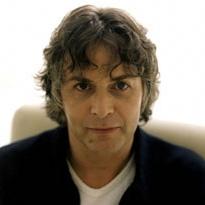Robert Sandall, the music writer and broadcaster, and one of the first members of The Arts Desk, died this morning from prostate cancer. He was 58. His wit, easy style and energetic intelligence were seen in a number of book and concert reviews he did for this site, despite the encroachment of cancer. His range of interest and enthusiasms were shown in the subjects he covered, from his acute interview with Katherine Jenkins to his study of the Steve Jobs effect on the music industry. He was a presenter of Radio 3's eclectic Mixing It and Late Junction, a former Sunday Times rock critic and a regular contributor to the serious arts pages.
Robert was born in London and studied English at Oxford and Cornell University in the USA. He played in a series of punk and post-punk rock bands that "have not gone down in history". He then became a "ski-bum" for three years - a combination of working and having fun on the slopes of Europe. At the same time, he continued his association with music and began to compose incidental music for radio plays. He began writing about music in 1986, contributing reviews and features to a number of publications, and became one of Q magazine's main feature writers.
In 1988, Robert was appointed as the Sunday Times rock critic and in 1990 became co-presenter on Mixing It, BBC Radio 3's eclectic mix of rare, strange and beautiful sounds, presented with musician Mark Russell. In the early Nineties, Robert became a presenter for Anglia Television and the cable channel VH1, and later joined Virgin Records. Recently he presented Radio 3's Late Junction, his last edition in June homing in on contemporary variants of the folk tradition, his choices including Natalie Merchant - whom he reviewed for theartsdesk - and Paul Weller.
Joe Muggs adds: 'His stint on Mixing It on Radio 3 (the cancellation of which was criminal) was a huge influence on me - one of the most important bits of music broadcasting of recent years, in fact, and instrumental in creating a climate where experimental music of all stripes could be considered on a level playing field. He will be very greatly missed.'
Ismene Brown adds: 'He was a real enthuser for all kinds of new discoveries, a keen supporter of theartsdesk, such a wonderful and easy writer, and we knew him for much too short a time.'
Bruce Dessau adds: 'Shocked and saddened to hear this. I worked with Robert at the very start of our careers in the Eighties and then lost touch with him when he went on to great things. I was always a fan of his eloquent, elegant writing and when I saw he was involved in TAD I was looking forward to catching up. Very upset that this will never happen now.'
Peter Culshaw adds: 'One of the most enjoyable things of working on theartsdesk in the last year was getting to know Robert Sandall, as I had previously only admired his writing from afar. Even when he was ill, his enthusiasm for a new record was infectious and he had an amazing knowledge and an unerring, unsnobbish taste in music and a wonderfully elegant style of writing. One of the best, anywhere. When reading his brilliant lead review of David Sylvian's album for the very first New Music CD Round-up was the first time I really thought theartsdesk was going to succeed in its aims and he was always tremendously supportive of the site. A lovely, funny, bright guy full of a huge fund of amazing music business anecdotes as well. Plenty of artists loved his acute ear and sympathetic nature as well - when Sade launched her new album last year, for example, she agreed to only one interview - with Robert. He really will be terribly missed.'
Adam Sweeting adds: 'I realised Robert was ill, but not how seriously. It’s very depressing to hear about what he endured over the last few months. I often used to bump into him at gigs, press dos and Brit Award shindigs when I was the Guardian rock critic, and always enjoyed his languid but piercingly shrewd observations. His experience of working on the “dark side”, as Communications Director of Virgin Records, had given him an insider’s understanding of how the really murky bits of the record industry operate, and that afforded him priceless ammunition for his writing. I used to think of him more as an essayist than a mere common-or-garden hack, and he had the gift of delivering killer blows beneath the urbane exterior of his writing. It was a feather in our cap to have him writing for theartsdesk. It’s tragic that he won’t be aboard for what we hope will be a brilliant future.'
- Tributes to Robert on Twitter














Add comment